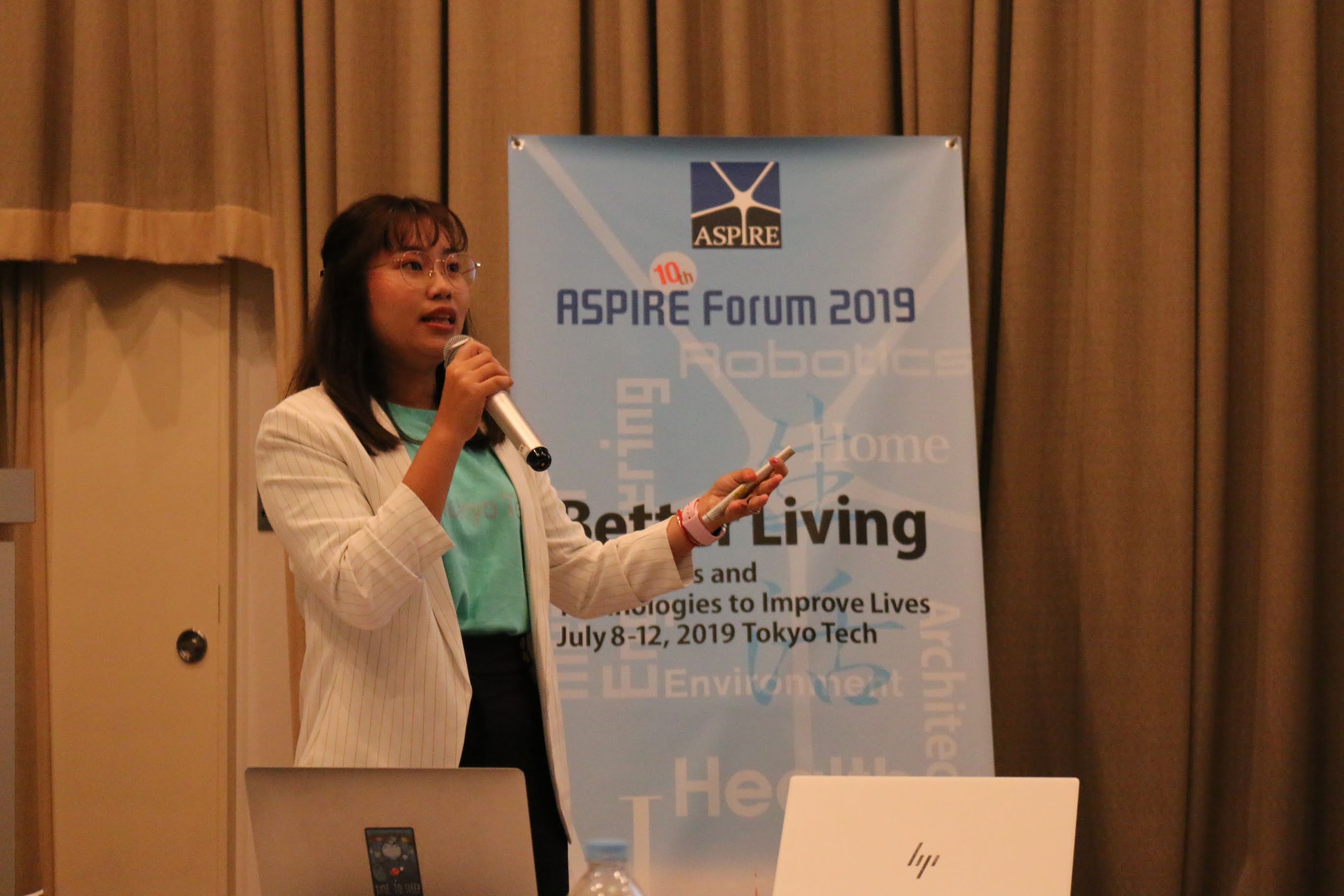Cambodian Female Trailblazer in AI Encourages Others: Keep Going

- By Sam Sopich
- February 1, 2022 6:54 PM
Cambodian scholar and PhD graduate Yean Seanglidet is a research fellow at the Nanyang Technological University in Singapore pays tribute to women in academia who have paved the way and aims to inspire others to follow her
Sam Sopich: What prompted you to pursue a career in computer science?
Yean Seanglidet: I found it rewarding to be able to solve challenging problems elegantly using logic—be it math or physics problems—so it was a natural choice to lean toward an engineering course. Among the choices, I chose computer science because I was intrigued by the fact that we could do just about anything with a computer.
Sam Sopich: What are the most pressing challenges for woman entering the fields of computer science or artificial intelligence?
Yean Seanglidet: I think AI or any other area of expertise come with their own set of challenges, but I am a big believer that when it comes to work like engineering, computing and AI, things such as gender or race shouldn’t come into play. It is all about how we, humans, think and solve problems. Hence, I have no doubt that women are as capable when it comes to this work.
Apart from the challenges that come with the job, the next challenge is the environment for women to excel in and the way to do that is by getting a head start. In terms of curiosity and interest, there are many young girls who aspire to pursue careers in this field.
However, there are still expectations, misconceptions or stereotypes that act as barriers or tone down that motivation. For example, “girls are not as smart as boys,” or “girls are only book smart,” or “women are too emotional. How can they solve things logically?” We’re told that nobody will hire women engineers and that “being an engineer or scientist is not womanly.”
Having been teased or heard those sentences repeatedly devastatingly lowers girls’ self-esteem and without us knowing it, we believe those untrue statements. That puts a huge barrier in young minds from pursuing this field.
I would highly encourage all of us to not repeat these sentences, hold back our judgment or expectation of girls and enable our young minds to follow our curiosities and interests. In addition, we can help correct those statements by making it clear to young girls that those are not true with many available examples and role models.
When women join the workforce, another challenge is to stay in the workforce and continue pursuing a career. Women are expected to be the primary caregivers of their family and kids. Some even give up their career to do that. While I respect everyone’s decision to lead their life, I think we can make work arrangements a better environment to support those who are caregivers, be it men or women.
To do that is to provide flexible working hours and having to share the load of child care more equally between both partners. The best thing about the job in computing/AI is that the nature of work is flexible and the flexible working hours could be easily enabled as seen during the COVID-19 pandemic.
Another challenge is getting women to lead as they move up the career ladder, which despite being natural, still leaves women underrepresented in leadership or management roles. Having transparent performance review and evaluation measurement units to recognize one’s performance would enable women to understand her capability and participate more.
We need to recognize the word “emotional” that has been villainized against women leaders. In fact, it is the ability to “empathize” that makes a great leader. And with that said, men also have emotions and empathy as any great leader should, so why don’t we praise this trait? Understand that having more women in management roles does not emasculate anyone. We’d all benefit as an organization, wouldn’t we?
Sam Sopich: Given its scope, in your opinion, what is the Artificial Intelligence? What is its role in human life?
Yean Seanglidet: Artificial Intelligence refers to the study process that learnt from data intelligently and independently. It often uses machine learning or deep learning techniques to spot patterns or learn to react in unseen situations.
Personally, its role is to assist human in reasoning, providing second opinions, forecasting and decision making with analysis and insights for a particular task such as medical imagery diagnosis, but also providing quick responses or virtual assistant 24/7 like chatbots that you can discuss with when you are stressed or answer biology questions or help with your schedule for example.

It’s also about automating defined and bounded tasks which are predictable, replaceable and obedian—for example, no gantries of smart carparks that automatically read the car license plate and bill the users or no cashier supermarket that shoppers could pick the items and walk out.
AI is also improving businesses through recommendation systems, optimizing production lines and inventory while providing personalized experience for users, which we’re also seeing in education. AI can personalize student learning and curriculum based on the student’s profile and psychology, but it’s also speeding up discoveries through automated lab work that helps with pharmaceutical research.
Sam Sopich: How do you see the role of Cambodian women in AI?
Yean Seanglidet: I think Cambodian women in the field of data science and AI are an untapped potential. I strongly believe that Cambodian women and men could take up the challenge and pursue this career and take up any roles in this field; be it developer, engineer, machine learning specialist, domain-specific researcher, data analyst, data science project manager, entrepreneur—the list goes on.
I could say that having women and men equally and actively participate in this field will harness more holistic perspectives and reasoning as well as minimize bias in the end product.
Sam Sopich: How can we encourage young women to take part in STEM subjects or technology?
YEAN Seanglidet: I would say let’s be open minded. I would encourage everyone to be open minded and follow their curiosity and interest and not to be scared of approaching subjects like math and science.
We should not see STEM as knowledge that only a certain type of people could do. It’s for everybody, but that applies to social sciences too. We should give all subjects a chance to understand what they are and the difference is that some people tend to be more interested in a certain subject than another.
For example, while I enjoy reading psychology books and finding countries on the world map, I tend to like solving physics problems more. With that case, I would lean into my interests and try to solve more challenging problems and I would still read on other subjects when I am free. Now in my career, I get to apply data science to geographical information systems known as geoinformatics. You never know when you need to use them again.
Try to broaden exposure to the subject. There is so much potential taking part in STEM. If you feel the path right now is narrowed, it could mean that you have not had enough exposure to this field yet. To beat this, connect with your seniors or role models to get that exposure. If you face push back due to external factors, keep going. They do not know what you are capable of. Your work is proven on paper, with your experiment results and contribution to the community/society. Real work is not defined by gender.
The last but most important tip is, if you are interested, just do it and keep going. It all will pay off. What my dad would always tell me is “If you are good at it, you will find a way no matter what.”
What I always tell myself is “I may not be good at it now but that just means I have not put in enough hours into this topic yet.”

Sam Sopich: Imagine that if Cambodia didn’t have enough AI experts, what would happen in the future?
Yean Seanglidet: With the global trend, AI is being integrated in our everyday life in one way or another. It helps increase productivity and innovation although some sectors are more ready to adopt AI than another. To stay with the trend, we do need to upskill our human resources and update our policies.
In my opinion, not having enough human resources to keep up with the trend would slow down the above-mentioned productivity as well as not being able to free up ourselves with the assistance of AI.
I would like to conclude this question with a positive note because I have interacted with Cambodian researchers, machine learning specialists, engineers and young data science enthusiasts that we are going in a direction that produces global talent in this field.
In addition, education is increasingly more accessible coupled with the enthusiasm to learn, I am optimistic that Cambodia’s human resources are going towards the trajectory of adopting AI, although some sectors/area of expertise might mature faster than others.
Sam Sopich: How will AI impact in the future for Cambodia such as working, society?
Yean Seanglidet: I think life-long learning and machine learning or computing-literacy will be the common thing adopted by society as we will need to continuously upskill our human resources.
We already have great software engineers up to international standards and it is only natural that we are going toward the AI-driven future by nurturing such talent. Businesses will adopt more AI-enabled technology to stay relevant.
Increasing public interest and literacy in the field of AI, as we are already using some of these products in real-life. Policies and regulation are being discussed and put in place for the ethical practice of AI.















